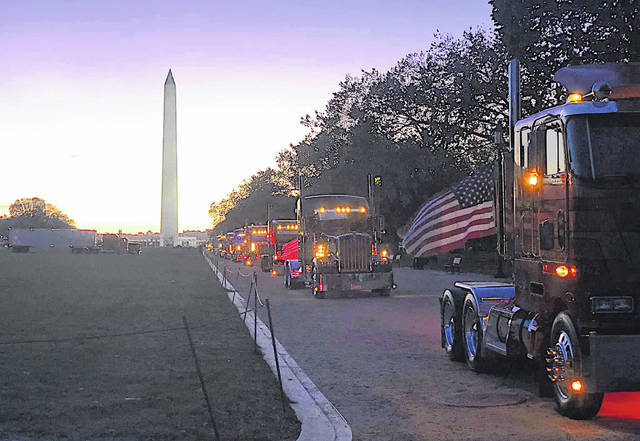

,On Thursday, semi-truck drivers and owner-operators from around the country entered Washington D.C. for the third annual Ten Four D.C. demonstration.
Among them was Todd Campbell, an owner-operator from Bainbridge who has been driving a truck for 22 years.
Campbell has been speaking out against regulations that disadvantage small trucking owner-operators since 2017.
“The whole trucking movement started in 2017 because of one thing: the ELD mandate — the electronic logging device,” Campbell said. “That’s how I got started in it, and that’s how all of us got started in it, but we’ve moved on and turned this thing into a unity-building thing. We’re having all of these groups come together, and it’s like, this is what we’ve needed this whole time — more people involved.”
The ELD mandate changed the way truck drivers and trucking companies tracked drivers’ time on the road. Instead of paper logs, electronic logs now keep track of the time drivers spend driving.
The ELD mandate helps enforce the Federal Motor Carrier Safety Administration (FMCSA)’s hours of service rules, which FMCSA defines as “the maximum amount of time drivers are permitted to be on duty including driving time, and specifies number and length of rest periods, to help ensure that drivers stay awake and alert.”
However, Campbell said larger trucking companies can afford to avoid breaking these rules as they have the personnel to send two drivers who can then alternate on longer trips.
In the decades before the ELD mandate, Campbell said he would “cheat” by adjusting hours logged on paper in order to be more productive when driving by himself.
“A lot of it was just, like, 15 minutes, 30 minutes, an hour, two hours,” Campbell said. “I would run stupid hard. If [someone working an office job wants] to get stuff done at home, you come work your job, you turn around and go home and get stuff done. We are away from home, so you’re either stuck sitting still or it’s like, ‘I’m wide awake — why ain’t I driving? I could be productive.’ That’s what it amounted to. I never worked more than 100 in a week. We’re allowed 70 in eight days.”
In 2017, Campbell connected with other groups of truck drivers and protested the mandate.
“You start having everything yanked away from you in this industry,” Campbell said. “Trucking has treated me very well, and it’s like, I’m not leaving anything for my kids and grandkids, and it’s 2017, and I never thought a thing about doing anything like this in my life.”
In October 2018, Campbell and Ten Four D.C., an organization that aims to provide a platform for truck drivers across the country to voice their concerns, became the first group to park multiple vehicles on the National Mall in Washington D.C. for an extended period of time during the organization’s first demonstration.
“We’re 100 percent non-political, impartial. Our motto is ‘it’s not about me — it’s about us,’” Campbell said. “As an industry as a whole, we want company drivers, we want fleet owners, owner-operators like me, everyone — to be involved. You don’t even have to be in the trucking industry. I know at least eight or ten people who come who don’t have CDLs, have never had a job in the transportation industry, but they have friends [in the transportation industry], and now they won’t miss anything that’s tied into it.”
The inaugural event, which was then known as “That’s a 10-4 on D.C.,” drew around 130 people, who parked 44 semi-trucks on the National Mall for nearly three days.
Though Campbell said most of the people who attend the Ten Four D.C. demonstration are owner-operators, the event also helps educate drivers on industry standards and fairness.
Past Ten Four D.C. events have introduced Campbell to Cuban and Hispanic people from areas like New York and New Jersey, where they haul containers that arrive at ports.
“They were the ones who were really complaining about how we’re being treated,” Campbell said. “They really are getting screwed. They’re doing stuff for nothing. They’re leased onto somebody, just pulling these containers. We’re trying to educate them on how the rest of the trucking industry works from a different aspect of what they’re doing.”
“Some of these guys came and every penny they had went into the fuel tank to get them there — they were flat-broke when they got to D.C. Like, ‘How can you do that?’ [They say,] ‘I’m losing money every day I work, so why work when I’m losing money every day? I might as well be here standing up, and if they repo my truck, they repo my truck.’ Some of those guys found better deals to go haul for, so they had an improvement when they went back and worked for somebody else. They had people who donated them some money to get back home.
“We had some great people who were out there doing things, who spent a lot of money and were like, ‘You don’t owe me anything. I don’t even care.’ We have some people with quite a bit of money who are in this. They just think it’s wrong. It’s not even that they agreed with what those people were protesting — they didn’t agree with why they were protesting; they thought it was stupid — but it’s like, how do you tell someone they’re stupid for what they believe? You don’t. You go try to educate them that they’re doing it wrong and they need to stand up for themselves. You don’t agree with why they’re there, but you’re there to support their first and second amendment rights.”
In the last few years, Campbell has also taken an active roll in affecting state and national policies. He has spoken with representatives from Ohio like U.S. Senator Rob Portman and U.S. Representative Brad Wenstrup as well as transportation committees — though he has reached out to many others.
As more than 80 percent of communities across the U.S. rely on trucks for consumer goods, according to the American Trucking Association, Campbell wants to bring awareness to the issues local truck drivers and owner-operators face.
“If it affects us, it affects you (consumers) too,” Campbell said. “Toilet paper should tell you that. Regulations slow the movement of freight.
“The other one, if you notice, produce does not last in your refrigerator. There’s a reason for that: it’s on a trailer too long. A semi trailer is only made to transport and maintain a temperature. It’s not cold like your refrigerator’s cold — it’ll be a blast of colder air to keep the temperature, and it hurts the shelf-life because it winds up being on a trailer for too long.”
For more information, visit tenfourdc.com.
Reach McKenzie Caldwell at 937-402-2570.



